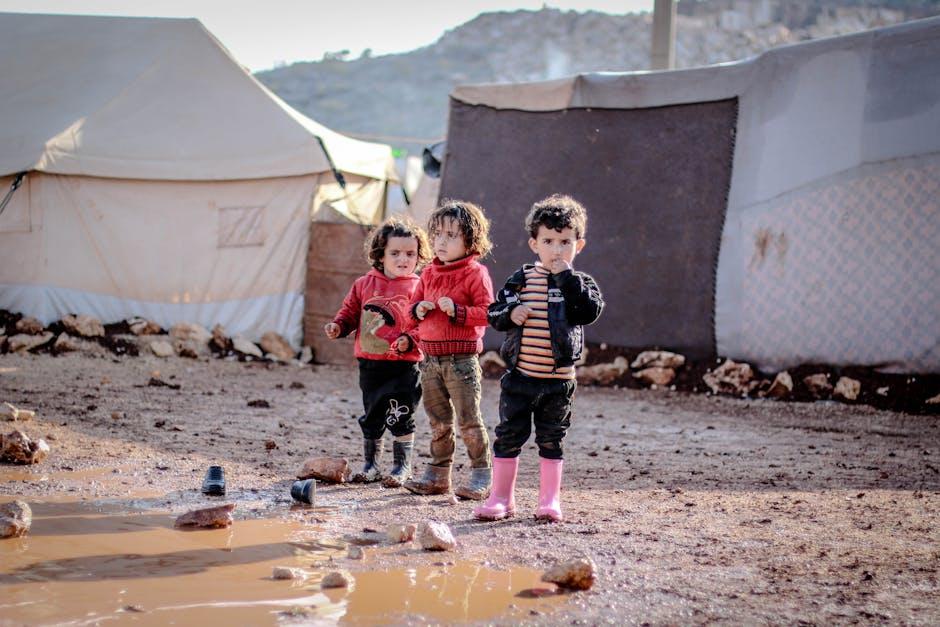In the tapestry of family vacations, where memories are woven from sunlit beaches and laughter-filled road trips, there lies an often overlooked thread—a child’s first encounter with the stark realities of poverty. As families traverse diverse landscapes and cultures, these experiences become more than just postcard moments; they evolve into powerful lessons in empathy and understanding. This article explores the delicate balance parents must strike as they guide their children through these encounters, transforming what could be an unsettling experience into an opportunity for growth and compassion. Join us as we delve into the nuanced world of family travel, where the journey is as much about discovering the world as it is about nurturing young hearts and minds.
Exploring Empathy: Guiding Children Through Diverse Realities
Traveling as a family can be a profound way to introduce children to the world’s diverse realities, offering opportunities for them to witness and reflect upon different living conditions, including poverty. As parents, it’s essential to guide these encounters with sensitivity and awareness. Here are some strategies to help navigate these situations:
- Open Conversations: Encourage your children to ask questions and express their feelings. Use their curiosity as a gateway to discuss economic disparities and the importance of empathy and understanding.
- Age-Appropriate Explanations: Tailor your discussions to suit their age. Younger children might grasp simple concepts of fairness, while older kids can engage in deeper discussions about social and economic systems.
- Empathy Through Action: Consider incorporating small acts of kindness into your travels, like donating to local charities or volunteering. This not only fosters empathy but also empowers children to be part of the solution.
By approaching these encounters thoughtfully, parents can help children build a foundation of empathy and social awareness, enriching their understanding of the world and their place within it.

Crafting Conversations: Addressing Difficult Questions with Sensitivity
- When traveling with children, especially to regions with visible poverty, it’s crucial to approach their questions with empathy and understanding. Instead of dismissing or glossing over their observations, use these moments as opportunities to foster compassion and awareness. Encourage your kids to express what they see and feel, and offer them a safe space to discuss their thoughts. This can help them develop a deeper understanding of the world and their place within it.
- Acknowledge the reality of the situation without overwhelming them with details that may be too complex for their age. You might say, “Yes, not everyone has the same opportunities or resources, and that’s why it’s important to be kind and help others when we can.” By validating their feelings and questions, you provide a foundation for a more profound empathy that can influence how they perceive and interact with the world around them.

Activities with Purpose: Fostering Understanding and Compassion
When embarking on family vacations, the unexpected moments often become the most impactful. Traveling to diverse destinations can open children’s eyes to different lifestyles, particularly in areas where poverty is prevalent. Such encounters can be pivotal in nurturing empathy and understanding. To ensure these experiences are meaningful, parents can guide their children through thoughtful engagement with local communities. Here are some purposeful activities to consider:
- Volunteering Together: Participate in local community service projects. This hands-on approach not only aids those in need but also teaches children the value of giving back.
- Cultural Exchanges: Arrange visits to local schools or community centers where kids can interact with peers, exchanging stories and learning about different life experiences.
- Storytelling and Reflection: Encourage children to write or draw their thoughts and feelings about their encounters, fostering a deeper understanding and compassion.
By integrating these activities into your travel itinerary, you can transform family vacations into journeys of learning and growth, helping children to appreciate the diverse world around them.
Balancing Enjoyment and Awareness: Creating Meaningful Family Experiences
When traveling with children, encountering different socio-economic conditions can be both eye-opening and challenging. To create a meaningful family experience, it’s essential to strike a balance between enjoyment and awareness. While it might be tempting to shield children from the harsher realities of life, allowing them to witness and understand poverty can cultivate empathy and a deeper appreciation for their own circumstances. Here are some ways to foster this balance:
- Engage in Open Conversations: Discuss the disparities they observe and encourage questions. This helps children process their observations and develop a thoughtful perspective.
- Participate in Community Activities: Involve the family in local volunteer efforts, which can be a rewarding way to connect with the community and contribute positively.
- Encourage Reflection: After visiting areas with visible poverty, prompt children to express their feelings through art or journaling, allowing them to articulate and reflect on their experiences.
By integrating these elements into your travels, you can transform family vacations into enriching experiences that nurture both enjoyment and a keen sense of social awareness.




